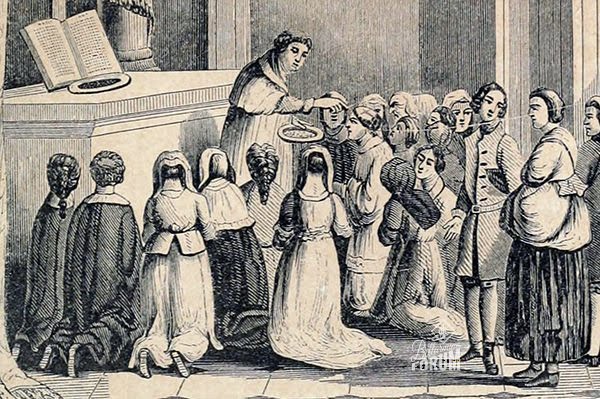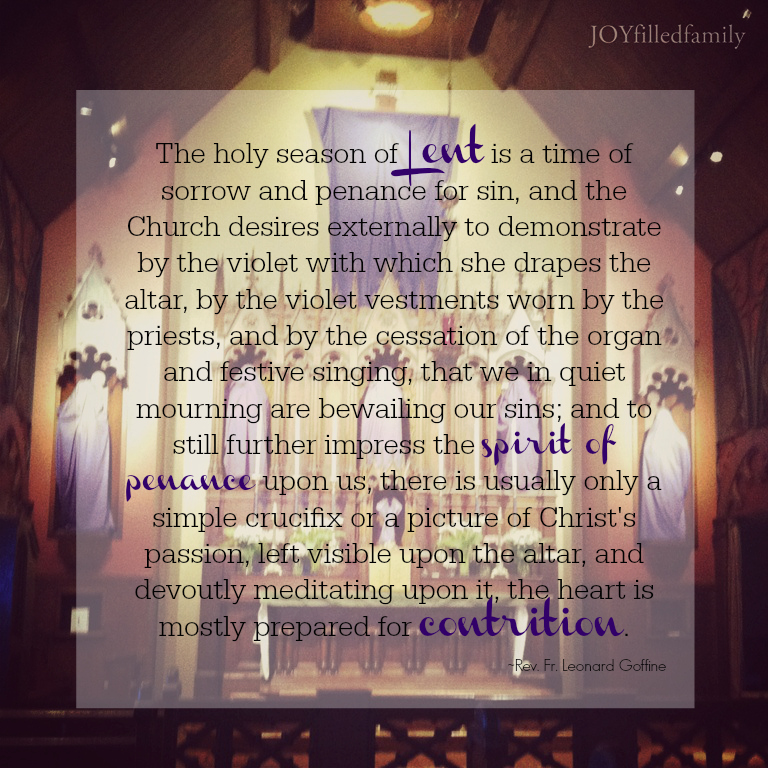THE BLESSING OF THE ASHES
The Function begins with the Blessing of the Ashes, which are to be put on our foreheads. These Ashes are made from the Palms, which were blessed the previous Palm Sunday. The Blessing they are now to receive in this their new form, is given in order that they may be made more worthy of that mystery of contrition and humility, which they are intended to symbolise.

The Choir begins by chanting this Antiphon, which is a prayer for Mercy.
Antiphon
Exaudi nos, Domine, quoniam benigna est misericordia tua: secundum multitudinem miserationum tuarum, respice nos, Domine.
Hear us, O Lord, for thy mercy is kind: look on us, O Lord, according to the multitude of thy mercies.
Ps. Salvum me fac, Deus: quoniam intraverunt aquæ usque ad animam meam. ℣. Gloria Patri. Exaudi nos.
Ps. Save me, O God: for the waters have reached my soul. ℣. Glory, &c. Hear us, &c.
The priest, standing at the altar, and having the ashes near him, begs of God, by the following prayers, that He would make them an instrument of our sanctification.
℣. Dominus vobiscum. ℣. The Lord be with you.
℟. Et cum spiritu tuo. ℟. And with thy spirit.
Oremus.
Omnipotens sempiterne Deus, parce pœnitentibus; propitiare supplicantibus: et mittere digneris sanctum angelum tuum de cœlis, qui bene ✠ dicat, et sancti ✠ ficet hos cineres, ut sint remedium salubre omnibus nomen sanctum tuum humiliter implorantibus, ac semetipsos pro conscientia delictorum suorum accusantibus, ante conspectum divinæ clementiæ tuæ facinora sua deplorantibus, vel serenissimam pietatem tuam suppliciter obnixeque flagitantibus: et præsta, per invocationem sanctissimi nominis tui: ut quicumque per eos aspersi fuerint, pro redemptione peccatorum suorum, corporis sanitatem et animæ tutelam percipiant. Per Christum Dominum nostrum. ℟. Amen.
Let us Pray.
O almighty and eternal God, spare those that repent, show mercy to those that humbly entreat thee; and vouchsafe to send from heaven thy holy angel, to bless ✠ and sanc ✠ tify these ashes, that they may be a wholesome remedy to all who humbly call upon thy holy name, and conscious of their sins, accuse themselves, and deplore their crimes in sight of thy divine Majesty, or humbly and earnestly have recourse to thy sovereign bounty; and grant, by our calling on thy most holy name, that whoever shall be touched by these ashes for the remission of their sins, may receive health of body and defense of soul. Through Christ our Lord. ℟. Amen.
Oremus.
Deus, qui non mortem sed pœnitentiam desideras peccatorum: gfragilitatem conditionis humanæ benignissime respice: et hos cineres, quos causa proferendæ humilitatis, atque promerendæ veniæ, capitibus nostris imponi decernimus, bened ✠ icere pro tua pietate dignare: ut, qui nos cinerem esse, et ob pravitatis nostræ demeritum in pulverem reversuros cognoscimus, peccatorum omnium veniam, et præmia pœnitentibus repromissa, misericorditer consequi mereamur. Per Christum Dominum nostrum. ℟. Amen.
Let us Pray.
O God, who desirest the conversion, and not the death of sinners, graciously consider the weakness of human nature, and mercifully vouchsafe to bless ✠ these ashes, which we design to receive on our heads, in token of our humiliation, and to obtain forgiveness; that we, who know what we are but ashes, and must return to dust because of our wickedness, may obtain through thy mercy, pardon of all our sins, and the recompense promised to penitents. Through Christ our Lord. ℟. Amen.
Oremus.
Deus qui humiliatione flecteris et satisfactione placaris: aurem tuæ pietatis inclina precibus nostris: et capitibus servorum tuorum, horum cinerum aspersione contactis, effunde propitius gratiam tuæ benedictionis: ut eos et spiritu compunctionis repleas, et quæ juste postulaverint, efficaciter tribuas; et concessa perpetuo stabilita et intacta manere decernas. Per Christum Dominum nostrum. ℟. Amen.
Let us Pray.
O God, who art appeased by humiliation, and pacified by sanctification, incline to our prayers the ears of thy mercy; and pour upon the heads of thy servants, covered with these ashes, the grace of thy blessing, so as both to fill them with the spirit of compunction, and to grant them the effects of their just desires; and, when granted, to remain stable and untouched for ever. Through Christ our Lord. ℟. Amen.
Oremus.
Omnipotens sempiterne Deus, qui Ninivitis in cinere et cilicio pœnitentibus indulgentiæ tuæ remedia præstitisti: concede propitius, ut sic eos imitemur habitu, quatenus veniæ prosequamur obtenu. Per Dominum. ℟. Amen.
Let us Pray.
O almighty and eternal God, who forgavest the Ninivites, when they did penance in sackcloth and ashes; mercifully grant us so to imitate their penance, that we may obtain pardon of our sins. Through, &c. ℟. Amen.
Having said the last of these prayers, the priest sprinkles the ashes with holy water, and censes them. The first in order of the priests who are present, marks the celebrant’s forehead with them. Then the ministers at the altar and the clergy receive them from the celebrant, who finally gives them to the faithful, saying:
Memento homo, quia pulvis es, et in pulverem reverteris.

Remember, man, that thou art dust, and into dust thou shalt return.
When the priest puts the holy emblem of penance upon you, accept in a spirit of submission the sentence of death which God Himself pronounces against you: Remember, O man, that thou art dust, and into dust thou shalt return! Humble yourself, and remember what it was that brought the punishment of death upon us: man wished to be as a god, and preferred his own will to that of his sovereign Master. Reflect, too, on that long list of sins which have added to the sin of your first parents, and adore the mercy of your God, who asks only one death for all these your transgressions.
During the time the priest is giving the ashes, the choir sings the following antiphons and responsory.
Anthem
Immutemur habitu, incinere et cilicio: jejunemus et ploremus ante Dominum, quia multum misericors est dimittere peccata nostra Deus noster.
Let us change our dress for ashes and sackcloth; let us fast and weep in the presence of the Lord; for our God is very merciful to forgive us our sins.
Anthem
Inter vestibulum et altare plorabunt sacerdotes ministri Domini, et dicent: Parce, Domine, parce populo tuo: et ne claudas ora canentium te, Domine. The priests, the ministers of the Lord, shall weep between the porch and the altar, and say: Spare, O Lord, spare thy people, and shut not the mouths of those who praise thee, O Lord.
Responsory
Emendemus in melius quæ ignoranter peccavimus: ne subito præoccupati die mortis, quæramus spatium pœnitentiæ, et invenire non possimus. * Attende, Domine, et miserere, quia peccavimus tibi.
Let us amend of the sins we have committed through ignorance: lest suddenly overtaken by the day of our death, we seek for time to do penance, and be not able to find it. * Look down on us, O Lord, and take pity; for we have sinned against thee.
Ps. Adjuva nos Deus salutaris noster: et propter honorem nominis tui Domine, libera nos. * Attende. ℣. Gloria Patri. * Attende.
Ps. Help us, O God our Savior: and deliver us for the glory of thy name, O Lord. * Look down, &c. ℣. Glory, &c. Look down, &c.
As soon as all the faithful have received the ashes, the priest sings the following prayer:
℣. Dominus vobiscum. ℣. The Lord be with you.
℟. Et cum spiritu tuo. ℟. And with thy spirit.
Oremus.
Concede nobis, Domine, præsidia militiæ christianæ sanctis inchoare jejuniis: ut contra spirituales nequitias pugnaturi, continentiæ muniamur auxiliis. Per Christum Dominum nostrum. ℟. Amen.
Let us Pray.
Grant us, O Lord, to begin with holy fasting our Christian warfare; that being to fight against spiritual wickedness, we may be aided therein by temperance. Through Christ our Lord. ℟. Amen.

Mass
The soul has regained her confidence by the act of humility she has performed. She approaches the God of mercy and reminds Him of the tender love He bears to His creature man, and of the patience wherewith He waits for his repentance. These are the sentiments expressed in the Introit, which is taken from the Book of Wisdom.
Introit
Misereris omnium, Domine, et nihil odisti eorum quæ fecisti, dissimulans peccata hominum propter pœnitentiam, et parcens illis: quia tu es Dominus Deus noster.
Ps. Miserere mei Deus, miserere mei; quoniam in te confidit anima mea. ℣. Gloria Patria. Misereris.
Thou, O Lord, hast mercy on all, and hatest none of those things which thou hast created; thou overlookest the sins of men, to draw them to repentance, and thou pardonest them; because thou art the Lord our God.
Ps. Have mercy on me, O God, have mercy on me; for my soul trusteth in thee. ℣. Glory, &c. Thou, O Lord, &c.
In the Collect, the Church prays that her children may have the twofold grace of a fervent commencement and steady perseverance in the salutary fast of Lent.
Collect
Præsta, Domine, fidelibus tuis, ut jejuniorum veneranda solemnia, et congrua pietate suscipiant, et secura devotione percurrant. Per Dominum.
Grant, O Lord, that thy faithful may enter on this solemn and venerable fast with suitable piety, and go through it with unmolested devotion. Through, &c.
Second Collect
A cunctis nos, quæsumus, Domine, mentis et corporis defende periculis: et intercedente beata et gloriosa semperque Virgine Dei Genitrice Matria, cum beato Joseph, beatis apostolis tuis Petro et Paulo, atque beato N. et omnibus sanctis, salutem nobis tribue benignus et pacem: ut, destructis adversitatibus et erroribus universis, Ecclesia tua secura tibi serviat libertate.
Preserve us, O Lord, we beseech thee, from all dangers of soul and body: and by the intercession of the glorious and blessed Mary, the ever Virgin Mother of God, of blessed Joseph, of thy blessed apostles Peter and Paul, of blessed N. (here is mentioned the titular saint of the church), and of all the saints, grant us, in thy mercy, health and peace; that all adversities and errors being removed, thy Church may serve thee with undisturbed liberty.
Third Collect
Omnipotens sempiterne Deus, qui vivorum dominaris simul et mortuorum, omniumque misereris, quos tuos fide et opere futuros esse prænoscis: te supplices exoramus; ut pro quibus effundere preces decrevimus quosque vel præsens seculum adhuc in carne retinet, vel futurum jam exutos corpore suscepit, intercedentibus omnibus sanctis tuis, pietatis tuæ clementia, omnium delictorum suorum veniam consequantur. Per Dominum.
O almighty and eternal God, who hast dominion over the living and the dead, and art merciful to all whom thou knowest will be thine by faith and good works: we humbly beseech thee, that they, for whom we have proposed to offer our prayers, whether this world still retains them in the flesh, or the next world hath already received them divested of their bodies, may, by the clemency of thine own goodness, and the intercession of thy saints, obtain pardon and full remission of their sins. Through, &c.
Epistle
Lesson from the Prophet Joel.Ch. ii.
Thus saith the Lord: be converted to me with all your heart, in fasting, and in weeping, and in mourning. And rend your hearts, and not your garments, and turn to the Lord your God: for he is gracious and merciful, patient and rich in mercy, and ready to repent of the evil. Who knoweth but he will return, and forgive, and leave a blessing behind him; sacrifice and libation to the Lord your God? Blow the trumpet in Sion, sanctify a fast, call a solemn assembly, gather together the people, sanctify the Church, assemble the ancients, gather together the little ones, and them that suck at the breasts: let the bridegroom go forth from his bed, and the bride out of the bride-chamber. Between the porch and the altar the priests, the Lord’s ministers, shall weep, and shall say: Spare, O Lord, spare thy people; and give not thine inheritance to reproach, that the heathens should rule over them. Why should they say among the nations: Where is their God? The Lord hath been zealous for his land, and hath spared his people. And the Lord answered, and said to his people: Behold, I will send you corn, and wine, and oil; you shall be filled with them, and I will no more make you a reproach among the nations, saith the Lord almighty.
We learn from this magnificent passage of the Prophet Joel how acceptable to God is the expiation of Fasting. When the penitent sinner inflicts corporal penance upon himself, God’s justice is appeased. We have a proof of it in the Ninivites. If the Almighty pardoned an infidel city, as Ninive was, solely because its inhabitants sought for mercy under the garb of penance; what will he not do in favour of his own people, who offer him the twofold sacrifice, exterior works of mortification, and true contrition of heart? Let us, then, courageously enter on the path of penance. We are living in an age, when, through want of faith and of fear of God, those practices which are as ancient as Christianity itself, and on which we might almost say it was founded, are falling into disuse: it behooves us to be on our guard, lest we, too, should imbibe the false principles, which have so fearfully weakened the Christian spirit. Let us never forget our own personal debt to the divine Justice, which will remit neither our sins nor the punishment due to them, except inasmuch as we are ready to make satisfaction. We have just been told, that these bodies, which we are so inclined to pamper, are but dust; and as to our souls, which we are so often tempted to sacrifice by indulging the flesh, they have claims upon the body, claims of both restitution and obedience.
We learn from this magnificent passage of the prophet Joel how acceptable to God is the expiation of fasting. When the penitent sinner inflicts corporal penance upon himself, God’s justice is appeased. We have a proof of it in the Ninivites. If the Almighty pardoned an infidel city, as Ninive was, solely because its inhabitants sought for mercy under the garb of penance; what will He not do in favor of His own people, who offer Him the two-fold sacrifice, exterior works of mortification, and true contrition of heart? Let us, then, courageously enter on the path of penance. We are living in an age when, through want of faith and of fear of God, those practices which are as ancient as Christianity itself, and on which we might almost say it was founded, are falling into disuse; it behooves us to be on our guard, lest we too should imbibe the false principles which have so fearfully weakened the Christian spirit. Let us never forget our own personal debt to the divine justice, which will remit either our sins nor the punishment due to them, except inasmuch as we are ready to make satisfaction. We have just been told that these bodies, which we are so inclined to pamper, are but dust; and as to our souls, which we are so often tempted to sacrifice by indulging the flesh, they have claims upon the body, claims of both restitution and obedience.
In the Gradual, the Church again pours forth the expressions of her confidence in the God of all goodness, for she counts upon her children being faithful to the means she gives them of propitiating His justice.
The Tract is that beautiful prayer of the psalmist, which she repeats thrice during each week of Lent, and which she always uses in times of public calamity, in order to appease the anger of God.
Gradual
Miserere mei Deus, miserere mei: quoniam in te confidit anima mea.
℣. Misit de cœlo, et liberavit me: dedit in opprobrium conculcantes me.
Have mercy on me, O God, have mercy on me; for my soul hath trusted in thee.
℣. He hath sent from heaven, and delivered me; he hath made them a reproach that trod upon me.
Tract
℣. Domine non secundum peccata nostra, quæ fecimus nos, neque secundum iniquitas nostras retribuas nobis.
℣. Domine, ne memineris iniquitatum nostrarum antiquarum: cito anticipent nos misericordiæ tuæ, quia pauperes facti summus nimis.
℣. Deal not with us, O Lord, according to our sins, which we have committed, nor punish us according to our iniquities.
℣. Remember not, O Lord, our former iniquities; let thy mercies speedily prevent us, for we are become exceedingly poor.
At this next verse the priest kneels down.
℣. Adjuva nos, Deus Salutaris noster: et propter gloriam nominis tui, Domine, libera nos: et propitius esto peccatis nostris, propter nomen tuum.
℣. Help us, O God, our Savior, and for the glory of thy name, O Lord, deliver us and forgive us our sins for thy name’s sake.
Gospel
Sequel of the Holy Gospel according to Matthew. Ch. vi.
At that time, Jesus said to his disciples: When you fast, be not as the hypocrites, sad. For they disfigure their faces, that they may appear unto men to fast. Amen, I say to you, they have received their reward. But thou, when thou fastest, anoint thy head, and wash thy face, that thou appear not to men to fast, but to thy Father, who is in secret: and thy Father, who seeth in secret, will repay thee. Let not up to yourselves treasures on earth, where the rust and moth consume, and where thieves break through and steal. But lay up to yourselves treasures in heaven, where neither rust nor moth doth consume, and where thieves do not break through, nor steal. For where thy treasure is, there is thy heart also.
Our Redeemer would not have us receive the announcement of the great feast as one of sadness and melancholy. The Christian who understands what a dangerous thing it is to be behindhand with divine justice welcomes the season of Lent with joy; it consoles him. He knows that if he be faithful in observing what the Church prescribes, his debt will be less heavy upon him. These penances, these satisfactions (which the indulgence of the Church has rendered so easy), being offered to God unitedly with those of our Savior Himself, and being rendered fruitful by that holy fellowship which blends into one common propitiatory sacrifice the good works of all the members of the Church militant, will purify our souls, and make them worthy to partake in the grand Easter joy. Let us not, then, be sad because we are to fast; let us be sad only because we have sinned and made fasting a necessity. In this same Gospel, our Redeemer gives us a second counsel, which the Church will often bring before us during the whole course of Lent: it is that of joining almsdeeds with our fasting. He bids us to lay up treasures in heaven. For this, we need intercessors; let us seek them amidst the poor.
In the Offertory, the Church rejoices in her children being set free; she foresees that the wounds of our souls will be healed, for she has confidence in us that we shall persevere, and this fills her with gladness.
Offertory
Exaltabo te, Domine, quoniam suscepisti me, nec delectasti inimicos meos super me: Domine, clamavi ad te, et sanasti me.
I will extol thee, O Lord, for thou hast upholden me, and hast not made my enemies to rejoice over me. O Lord, I have cried to thee, and thou hast healed me.
Secret
Fac nos, quæsumus, Domine, his muneribus offerendis convenienter aptari; quibus ipsius venerabilis sacramenti celebramus exordium. Per Dominum.
Grant, O Lord, that we may be duly prepared to present these our offerings, by which we celebrate the institution of this venerable mystery. Through, &c.
Second Secret
Exaudi nos, Deus Salutaris noster: ut per hujus Sacramenti virtutem, a cunctis nos mentis et corporis hostibus tuearis, gratiam tribuens in præsenti, et gloriam in futuro.
Graciously grant us, O God our Savior, that by virtue of this Sacrament, thou mayst defend us from all enemies, both of soul and body; giving us grace in this life, and glory in the next.
Third Secret
Deus, cui soli cognitus est numerus electorum in superna felicitate locandus; tribue quæsumus, ut intercedentibus omnibus sanctis tuis, universorum, quos in oratione commendatos suscepimus, et omnium fidelium nomina, beatæ prædestinationis liber adscripta retineat. Per Dominum.
O God, to whom alone is known the number of thine elect to be placed in eternal bliss: grant, we beseech thee,by the intercession of all thy saints, that the book of predestination may contain the names of all those whom we have undertaken to pray for, as well as those of all the faithful. Through, &c.
The Preface
Vere dignum et justum est, æquum et salutare, nos tibi semper, et ubique gratias agere, Domine sancte, Pater omnipotens, æterne Deus. Qui corporali jejunio vitia comprimis, mentem elevas, virtutem largiris et præmia, per Christum Dominum nostrum. Per quem majestatem tuam laudant Angeli, adorant Dominationes, tremunt Potestates: Cœli, cœlorumque Virtutes, ac beata Seraphim, socia exsultatione concelebrant. Cum quibus et nostras voces, ut admitti jubeas deprecamur, supplici confessione, dicentes: Sanctus, Sanctus, Sanctus.
It is truly meet and just, right and available to salvation, that we should always and in all places give thanks to thee, O holy Lord, Father almighty, eternal God. Who by this bodily fast extinguishest our vices, elevatest our understanding, bestowest on us virtue and its rewards, through Christ our Lord. By whom the Angels praise thy majesty, the Dominations adore it, the Powers tremble before it; the Heavens and the heavenly Virtues, and the blessed Seraphim, with common jubilee, glorify it. Together with whom, we beseech thee that we may be admitted to join our humble voices, saying: Holy! Holy! Holy!
The words of the Church in the Communion antiphon contain an instruction of great importance to us. During this long career of penance, we shall stand in need of something to keep up our courage: let us meditate on the law and the mysteries of our Lord. If we relish the word of God as it is offered us by the Church on each day of this holy season, our hearts will receive an increase of light and love, and when our Lord shall rise from His tomb, the brightness of His Resurrection will shine upon us.
Communion
Qui meditabitur in lege Domini die ac nocte, dabit fructum suum in tempore suo.
He that meditateth day and night on the law of the Lord, shall yield his fruit in due season.
Postcommunion
Percepta nobis, Domine præbeant Sacramenta subsidium: ut tibi grata sint nostra jejunia, et nobis proficiant ad medelam. Per Dominum.
May the mysteries we have received, O Lord, afford us help, that our fasting may be acceptable to thee, and become a remedy to us. Through, &c.
Second Postcommunion
Mundet et muniat nos, quæsumus, Domine, divini Sacramenti munus oblatum: et intercedente beata Virgine Dei Genitrice Maria, cum beato Joseph, beatis apostolis tuis Petro et Paulo, atque beato N. et omnibus sanctis, a cunctis nos reddat et perversitatibus expiatos, et adversitatibus expeditos.
May the oblation of this divine Sacrament, we beseech thee, O Lord, both cleanse and defend us: and by the intercession of blessed Mary, the Virgin Mother of God, of blessed Joseph, of thy blessed apostles, Peter and Paul, of blessed N., and of all the saints, free us from all sin, and deliver us from all adversity.
Third Postcommunion
Purificent nos, quæsumus, omnipotens et misericors Deus, Sacramenta quæ sumpsimus: et intercedentibus omnibus sanctis tuis, præsta ut hoc tuum Sacramentum non sit nobis reatus ad pœnam, sed intercessio salutaris ad veniam: sit ablutio scelerum, sit fortitudo fragilium, sit conta omnia mundi pericula firmamentum: sit vivorum atque mortuorum fidelium remissio omnium delictorum. Per Dominum.
May the mysteries we have received, purify us, we beseech thee, O almighty and merciful God; and grant by the intercession of all thy saints, that this thy Sacrament may not increase our guilt to punishment, but be a means of obtaining pardon in order to salvation. May it wash away sin, strengthen our frailty, secure us against the dangers of the world; and procure forgiveness for all the faithful, both living and dead. Through, &c.
Every day during Lent, Sundays excepted, the priest, before dismissing the faithful, here adds a special prayer,
which is preceded by these words of admonition:
Oremus.
Humilitate capita vestra Deo.
Let us Pray.
Bow down your heads to God.
Prayer
Inclinantes se, Domine, majestati tuæ, propitiatus intende: ut qui divino munere sunt refecti, cœlestibus semper nutriantur auxiliis. Per Dominum.
Mercifully look down upon us, O Lord, bowing down before thy divine Majesty, that they who have been refreshed with thy divine mysteries, may always be supported by thy heavenly aid. Through, &c.

INSTRUCTION ON ASH WEDNESDAY
Taken from Fr. Leonard Goffine’s Explanations of the Epistles and Gospels for the Sundays, Holydays, and Festivals throughout the Ecclesiastical Year 36th edition, 1880
![[Image: ?u=http%3A%2F%2F4.bp.blogspot.com%2F-TYv...f=1&nofb=1]](https://external-content.duckduckgo.com/iu/?u=http%3A%2F%2F4.bp.blogspot.com%2F-TYvR_5AUAvI%2FURu_zCOeQaI%2FAAAAAAAAE30%2FjnYK-lNCby8%2Fs1600%2Fashwednesday%2B2.jpg&f=1&nofb=1)
Why is this day thus named?
BECAUSE on this day the Church blesses ashes, and places them on the heads of her faithful children, saying: “Remember man, thou art dust, and unto dust thou shalt return.”
Why is this done?
St. Charles Borromeo gives us the following reasons for this practice : that the faithful may be moved to sincere humility of heart; that the heavenly blessing may descend upon them, by which they, being really penitent, will weep with their whole soul for their sins, remembering how earth was cursed because of sin, and that we have all to return to dust; that strength to do true penance may be given the body, and that our soul may be endowed with divine grace to persevere in penance.
With such thoughts let the ashes be put upon your head, while you ask in all humility and with a contrite heart, for God’s mercy and grace.
Is the practice of putting ashes upon our heads pleasing to God?
It is, for God Himself commanded the Israelites to put ashes on their heads for a sign of repentance. (Jer. xxv. 34.) Thus did David (Ps. ci. 10.) who even strewed ashes on his bread; the Ninivites, (Jonas iii. 5.) Judith, (Jud. ix. i.) Mardochai, (Esth. iv. i.) Job, (Job. xlii. 6.) etc. The Christians of the earliest times followed this practice as often as they did public penance for their sins.
Why from this day until the end of Lent are the altars draped in violet?
Because, as has been already said, the holy season of Lent is a time of sorrow and penance for sin, and the Church desires externally to demonstrate by the violet with which she drapes the altar, by the violet vestments worn by the priests, and by the cessation of the organ and festive singing, that we in quiet mourning are bewailing our sins ; and to still further impress the spirit of penance upon us, there is usually only a simple crucifix or a picture of Christ’s passion, left visible upon the altar, and devoutly meditating upon it, the heart is mostly prepared for contrition.
In the Introit of this day’s Mass the Church uses the following words to make known her zeal for penance, and to move God to mercy: Thou hast mercy upon all, O Lord, and hatest none of the things which Thou hast made, winking at the sins of men for the sake of repentance, and sparing them; for thou art the Lord our God. (Wisd.’&.i. 24.25.) Have mercy on me, O God, have mercy on me; for my soul trusteth in thee. (Ps. 1-vi. 2.) Glory be to the Father, &c.
PRAYER OF THE CHURCH: Grant to thy faithful, O Lord, that they may begin the venerable solemnities of fasting with suitable piety, and perform them with tranquil devotion. Through Jesus Christ, our Lord, etc.
EPISTLE (Joel ii. 1219.; Thus saith the Lord: Be converted to me with all your heart, in fasting, and in weeping, and in mourning. And rend your hearts and not your garments, and turn to the Lord your God; for he is gracious and merciful, patient and rich in mercy, and ready to repent of the evil. Who knoweth but he will return, and forgive, and leave a blessing behind him, sacrifice and libation to the Lord your God? Blow the trumpet in Sion: sanctify a fast; call a solemn assembly; gather together the people; sanc- tify the Church; assemble the ancients; gather together the little ones, and them that suck at the breasts; let the bridegroom go forth from his bed, and the bride out of her bride-chamber. Between the porch and the altar the priests, the Lord’s ministers, shall weep; and shall say: Spare, O Lord, spare thy people; and give not thine inheritance to reproach, that the heathens should rule over them. Why should they say among the nations: Where is their God? The Lord hath been zealous for his land, and hath spared his people. And the Lord answered, and said to his people: Behold, I will send you corn, and wine, and oil, and you shall be filled with them; and I will no more make you a reproach among the nations, saith the Lord Almighty.
EXPLANATION: The Prophet Joel exhorts the Jews to sorrow and penance for their sins, that they evade the expected judgment to be sent by God upon the city of Jerusalem. He required of them to show their repentance not merely by rending their garments, a sign of mourning with the Jews, but by a truly contrite heart. The Church wishes us to see plainly from this lesson of the prophet what qualities our penance should possess, if we desire rec- onciliation with God, forgiveness of our sins, and deliverance at the Last Day, which qualities are not merely abstinence from food and amusements, but the practice of real mortification of our evil inclinations, thus becoming with our whole heart converted to God.
GOSPEL (Matt. vi. 16 21.) AT THAT TIME, Jesus said to his disciples: When you fast, be not as the hypocrites, sad. For they disfigure their faces, that they may appear unto men to fast. Amen I say to you, they have received their reward. But thou, when thou fastest, anoint thy head and wash thy face, that thou appear not to men to fast, but to thy Father who is in secret, and thy Father who seeth in secret will repay thee ? Lay not up to yourselves treasures on earth, where the rust and moth consume, and where thieves break through and steal. But lay up to your- selves treasures in heaven, where neither the rust nor moth doth consume, and where thieves do not break through nor steal. For where thy treasure is, there is thy heart also.
EXPLANATION: Jesus forbids us to seek the praises of men when performing good works, (fasting is a good work,) and still worse it would be to do good as the Pharisees , through hypocrisy. He also warns us against avarice and the desire for temporal riches, urging us to employ our temporal goods, in giving alms, and doing works of charity, thus laying up treasures in heaven, which are there rewarded and will last there forever. “What folly”, says St. Chrysostom, “to leave our goods where we cannot stay, instead of sending them before us where we are going to heaven!”
ASH WEDNESDAY
![[Image: ?u=https%3A%2F%2Fima.princeton.edu%2Fwp-...f=1&nofb=1]](https://external-content.duckduckgo.com/iu/?u=https%3A%2F%2Fima.princeton.edu%2Fwp-content%2Fuploads%2F2017%2F02%2Fw174.028ra.jpg&f=1&nofb=1)
The Liturgical Year by Dom Prosper Gueranger (1841-1875)
Yesterday the world was busy in its pleasures, and the very children of God were taking a joyous farewell to mirth: but this morning, all is changed. The solemn announcement, spoken of by the prophet, has been proclaimed in Sion: the solemn fast of Lent, the season of expiation, the approach of the great anniversaries of our Redemption. Let us, then, rouse ourselves, and prepare for the spiritual combat.
But in this battling of the spirit against the flesh we need good armor. Our holy mother the Church knows how much we need it; and therefore does she summon us to enter into the house of God, that she may arm us for the holy contest. What this armor is we know from St. Paul, who thus describes it: Have your loins girt about with truth, and having on the breastplate of justice, and your feet shod with the preparation of the Gospel of peace. In all things, taking the shield of faith. Take unto you the helmet of salvation, and the sword of the Spirit, which is the word of God. The very prince of the apostles, too addresses these solemn words to us: Christ having suffered in the flesh, be ye also armed with the same thought. We are entering today upon a long campaign of warfare spoken of by the apostles: forty days of battle, forty days of penance. We shall not turn cowards, if our souls can but be impressed with the conviction that the battle and the penance must be gone through. Let us listen to the eloquence of the solemn rite which opens our Lent. Let us go whither our mother leads us, that is, to the scene of the fall.
The enemies we have to fight with are of two kinds: internal and external. The first are our passions; the second are the devils. Both were brought on us by pride, and man’s pride began when he refused to obey his God. God forgave him his sin, but He punished him. The punishment was death, and this was the form of the divine sentence: Thou art dust, and into dust thou shalt return. Oh that we had remembered this! The recollection of what we are and what we are to be would have checked that haughty rebellion which has so often led us to break the law of God. And if, for the time to come, we would persevere in loyalty to Him, we must humble ourselves, accept the sentence, and look on this present life as a path to the grave. The path may be long or short; but to the tomb it must lead us. Remembering this, we shall see all things in their true light. We shall love that God who has deigned to set His heart on us notwithstanding our being creatures of death: we shall hate, with deepest contrition, the insolence and ingratitude wherewith we have spent so many of our few days of life, that is, in sinning against our heavenly Father: and we shall be not only willing, but eager, to go through these days of penance, which He so mercifully gives us for making reparation to His offended justice.
This was the motive the Church had in enriching her liturgy with the solemn rite at which we are to assist this morning. When upwards of a thousand years ago she decreed the anticipation of the lenten fast by the last four days of Quinquagesima week, she instituted this impressive ceremony of signing the forehead of her children with ashes, while saying to them those awful words wherewith God sentenced us to death: Remember, O man, that thou art dust, and into dust thou shalt return! But making use of ashes as a symbol of humiliation and penance is of a much earlier date than the institution we allude to. We find frequent mention of it in the Old Testament. Job, though a Gentile, sprinkled his flesh with ashes, that thus humbled, he might propitiate the divine mercy: and this was two thousand years before the coming of our Savior. The royal prophet tells us of himself, that he mingled ashes with his bread, because of the divine anger and indignation. Many such examples are to be met with in the sacred Scriptures; but so obvious is the analogy between the sinner who thus signifies his grief, and the object whereby he signifies it, that we read such instances without surprise. When fallen man would humble himself before the divine justice, which has sentenced his body to return to dust, how could he more aptly express his contrite acceptance of the sentence, than by sprinkling himself, or his food, with ashes, which is the dust of wood consumed by fire? This earnest acknowledgement of his being himself but dust and ashes is an act of humility, and humility ever gives him confidence in that God who resists the proud and pardons the humble.
It is probable that, when this ceremony of the Wednesday in Quinquagesima week was first instituted, it was not intended for all the faithful, but only for such as had committed any of those crimes for which the Church inflicted a public penance. Before the Mass of the day began, they presented themselves at the church, where the people were all assembled. The priests received the confession of their sins, and then clothed them in sackcloth, and sprinkled ashes on their heads. After this ceremony, the clergy and the faithful prostrated and recited aloud the seven Penitential Psalms. A procession, in which the penitents walked barefooted, then followed; and on its return, the bishop addressed these words to the penitents: “Behold, we drive you from the doors of the church by reason of your sins and crimes, as Adam, the first man, was driven out of paradise because of his transgression.” The clergy then sang several responsories, taken from the Book of Genesis, in which mention was made of the sentence pronounced by God when He condemned man to eat his bread in the sweat of his brow, for that the earth was cursed on account of sin. The doors were then shut, and the penitents were not to pass the threshold until Maundy Thursday, when they were to come and receive absolution.
Dating from the 11th Century, the discipline of Public Penance began to fall into disuse, and the holy rite of putting Ashes on the heads of all the Faithful indiscriminately, became so general, that, at length, it was considered as forming an essential part of the Roman Liturgy. Formerly, it was the practice to approach bare-footed to receive this solemn Memento of our nothingness; and we find, that even so early as the 12th century, the Pope himself, when passing from the Church of Saint Anastasia to that of Saint Sabina, at which the Station was held, went the whole distance bare-footed, as also did the Cardinals, who accompanied him. The Church no longer requires this exterior penance ; but she is as anxious as ever, that the holy ceremony, at which we are about to assist, should produce in us the sentiments she intended to convey by it, when she first instituted it.
As we have just mentioned, the Station, in Rome, is at Saint Sabina, on the Aventiue Hill. It is under the patronage of this holy Martyr that she opens the penitential Season of Lent.



















